Elizabeth Warren on Why Billionaires Should Fund Medicare for All—Not the Presidency
Jessica Pels: Welcome, Senator Warren.
Elizabeth Warren: Thank you. It’s so good to be here.
Jessica Pels: We’re so happy to have you at Cosmo, especially now that we’re officially in election year.
Elizabeth Warren: We are.
Jessica Pels: Dun dun dun.
Elizabeth Warren: *dramatic voice* 2020.
Jessica Pels: Yes.
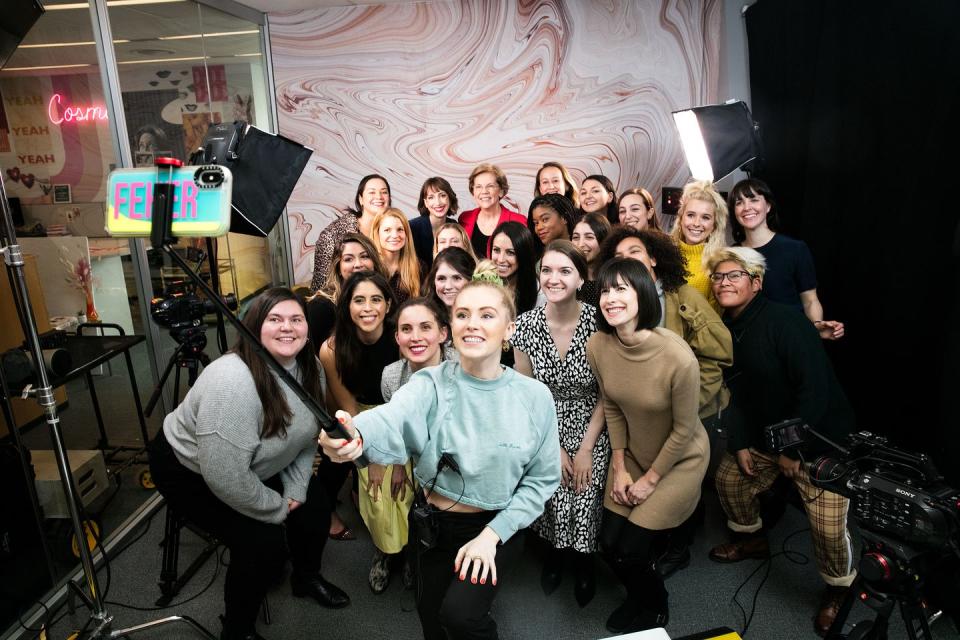
Elizabeth Warren: I feel like I ought to be traveling with theme music.
Jessica Pels: Yes!
Elizabeth Warren: Well, you know I kind of do. You know I do selfie lines?
Jessica Pels: Yes.
Elizabeth Warren: Do you know how they start? The selfie lines start when somebody introduces and I come out. And they’re doing Dolly Parton’s “9 to 5.”
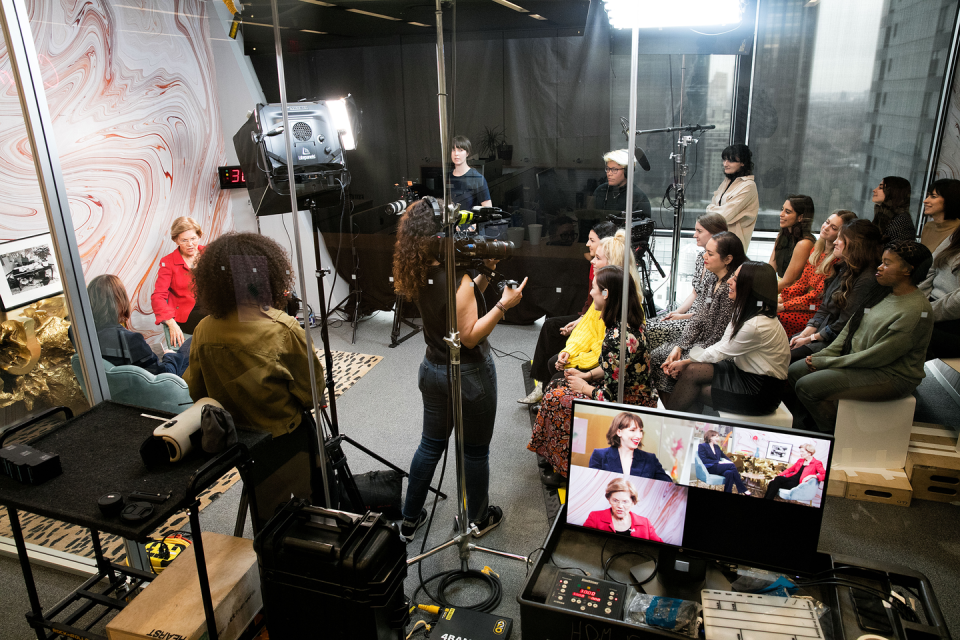
Jessica Pels: We’ll play it.
Elizabeth Warren: It’s actually hard not to dance my way out, because it’s just such a great piece of music. And really, in many ways, what this campaign is about: Women are here working 9 to 5.
Jessica Pels: I love that. I love that. So Cosmo reaches 81 million young people. And our latest polling shows that 64 percent of them still don’t know who they support in this election.
Elizabeth Warren: Let’s change that.
Jessica Pels: Yes, so our goal with this interview series is to expose to our audience of millennial and Gen Z women which candidates prioritize young women and how they prioritize young women. So I’m just going to jump right in.
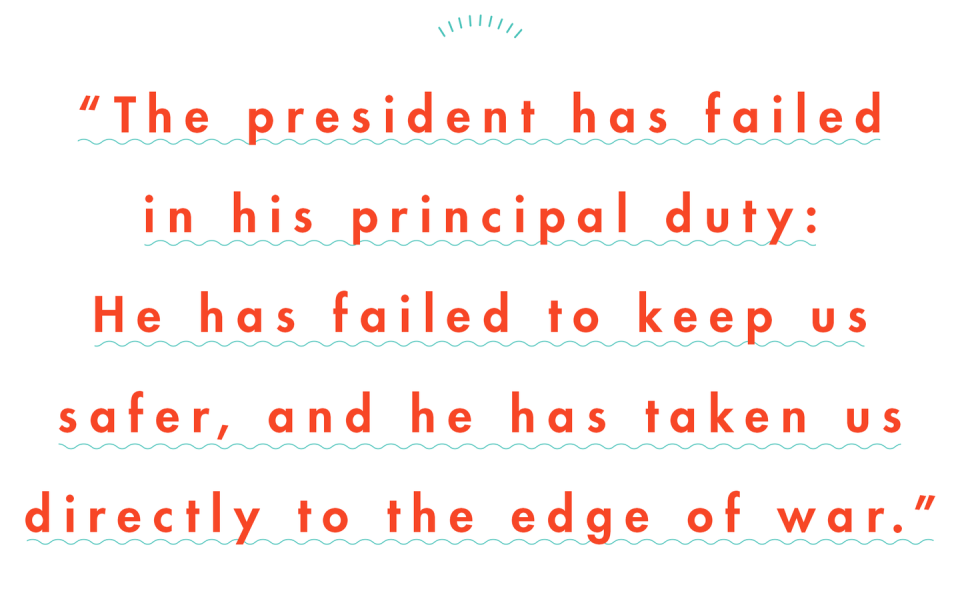
Elizabeth Warren: Sure!
Jessica Pels: So this may come as a surprise, but health care is actually the number one issue for our readers, according to our latest polling, even over climate change. Which, considering what’s happening in Australia, is significant—that shows you how much they prioritize their health.
Elizabeth Warren: That’s right. That’s how personal it is.
Jessica Pels: Yes, exactly. And how financial.
Elizabeth Warren: Yes.
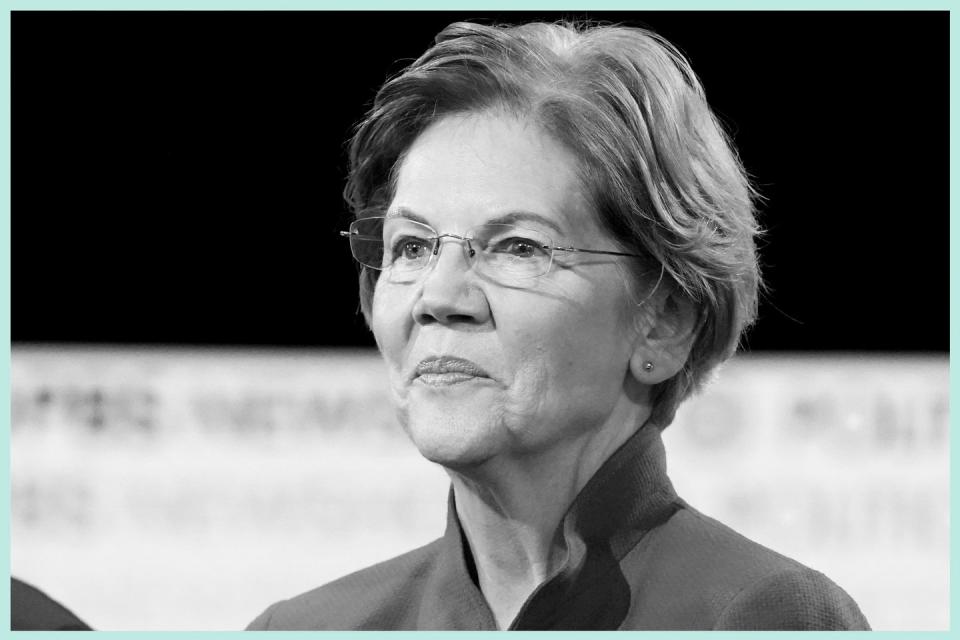
Jessica Pels: So increasingly, the candidate field is divided between people like yourself and Senator Sanders, who embrace Medicare for All, and those who say that getting rid of private insurance is politically or practically impossible. For the 34 percent of our readers who have been swayed by that latter argument, why do you still believe that Medicare for All is the right thing?
Elizabeth Warren: So, last year, 36 million Americans didn’t have a prescription filled because they couldn’t pay for it. Think about that—they were sick enough to go to the doctor and to have the doctor write out a prescription and to get to the pharmacy and say, “I just can’t do this.” And think about people who did pay for it, who then had to make the decision whether to pay the rent late or pay for your health insurance.
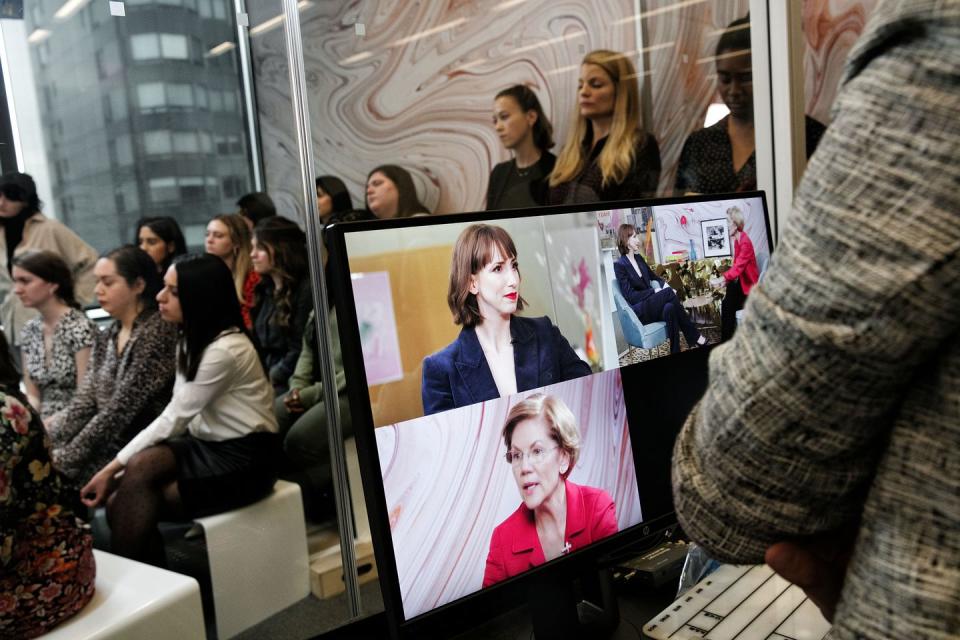
And it’s that way all the way through—about not going to the doctor to have the lump checked out, about not having the additional tests done that the doctor wants you to have. We are the richest country in the history of the world. Health care is a basic human right, and we need to find the best way to get health care to all of us. That’s what all other peer countries have done.
So here’s how I think about this: We need to bring the most help to the most people as quickly as possible. So I start this by saying, “Okay, what can a president do”—oh, and I love saying this—“all by herself?” And the answer is, quite a lot, actually.
So what will I do? First thing I’ll do as president starting day one: defend the Affordable Care Act. The current administration has been knocking the legs out from underneath it. That would knock a lot of young people who are 26 and younger and on their parents’ plans—bingo, you got no health insurance. Would permit a discrimination against people with preexisting conditions, if the Trump administration continues to go forward.
And by the way, keep in mind, before the Affordable Care Act passed, insurance companies actually discriminated against a really important class: women. And charged women more because they didn’t want to have to pay for health services for women. So I’ll defend the Affordable Care Act, and that’s important. You can do that through administrative channels.
Second thing I’ll do is, I’m coming after the drug companies. The power has been there for a long time. For a president to actually be able to bring down the costs of prescription drugs that are still under patent. So I’m going to use that power to bring down the cost of insulin, the cost of EpiPens, the cost of HIV/AIDS drugs—that’s going to save American families hundreds of millions of dollars right off the bat.
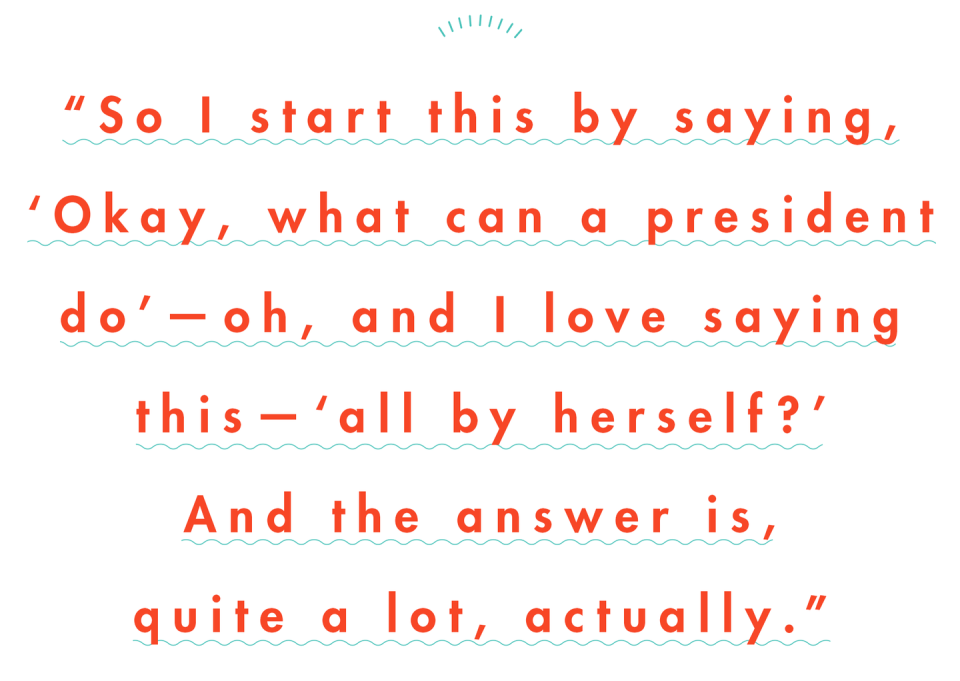
So in other words, I want to come right in and be practical. Let’s pick some low-hanging fruit and get some help to people. Then, in the first hundred days, what I want to get done is I want us to pass a bill that makes health care available to everyone. And here’s how this would work: I have a plan that will let us do full health care coverage without raising taxes on middle class families by one dime. It doesn’t raise taxes on working people by one dime.
It’s basically paid for by asking those at the top, the top 1 percent, to pay a little more. Asking giant corporations like Amazon, that paid nothing in taxes last year, to pay. And my personal favorite: by cracking down on the big tax cheats at the top, where we can pick up a lot of money to be able to do that.
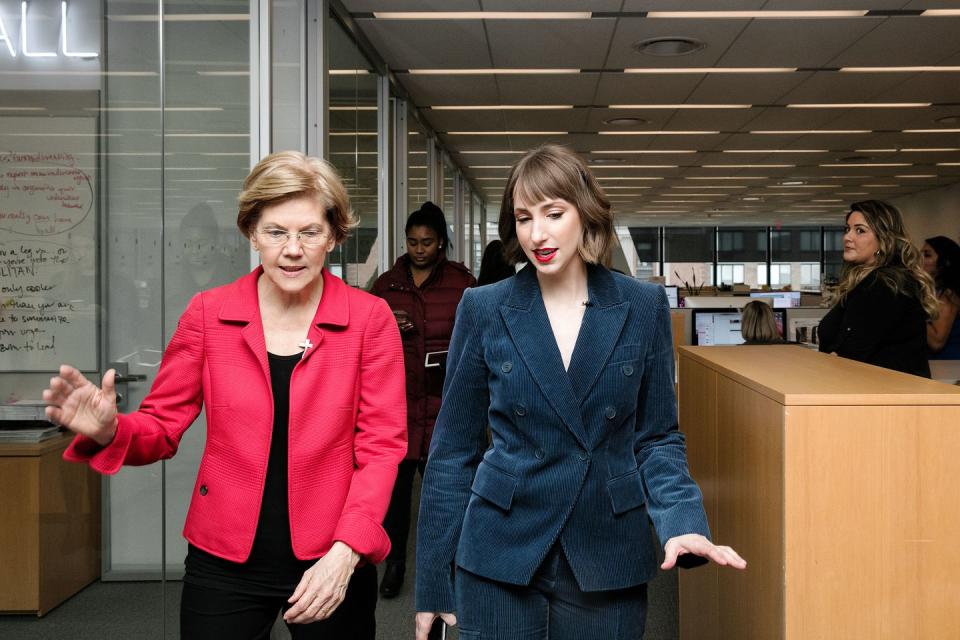
I then want to use that money, and we can do this...by the way, I won’t get too wonky, but in budget reconciliation, which means you can do it with 50 votes, you don’t have to get to 60 votes for this. So in 50 votes, we make, we’ve got the money, we can offer health care to 135 million Americans at no cost to them. And we can offer full health care coverage to everyone else at a modest cost, because I have a way to pay for it and we can subsidize that.
The idea is, let people experience what health care is like when it’s just you and your doctor or your nurse practitioner or your mental health professional or your physical therapist without some insurance company standing in between tens of millions of Americans. Try it on. Try it on. And then, when lots of people have had a chance to do that, then we’ll vote on making a transition to a full Medicare for All. That’s what we do in a democracy.
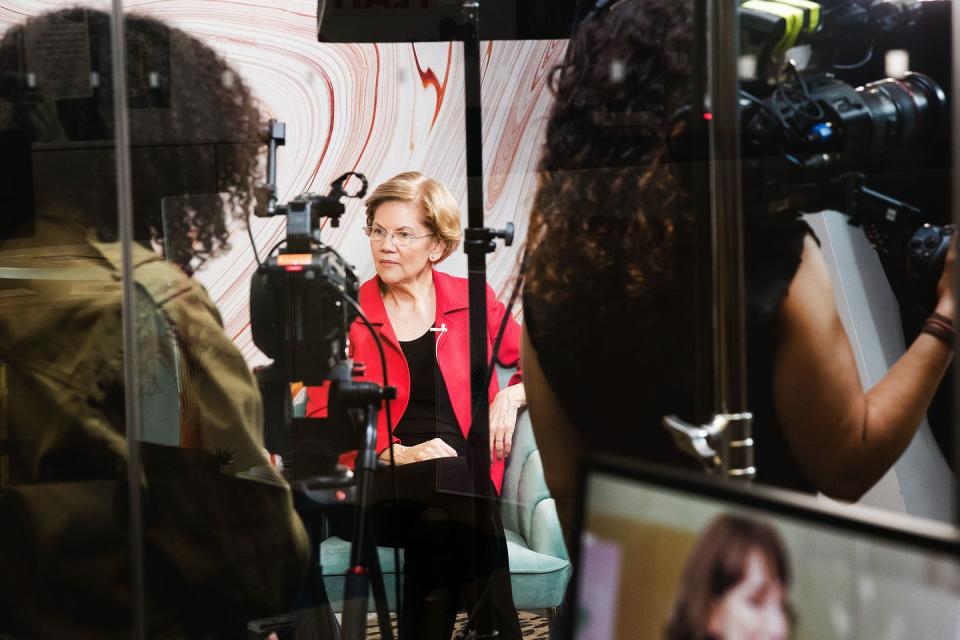
I feel confident people are going to like this. It’s paid for, and it works for people all across this country. But we can do this so people get a chance to try it out, because health care really matters. But ultimately, where it’s pulling us is we’ve got to be in a place where everybody in this country gets health care coverage and nobody doesn’t get a prescription filled or a lump checked out because they’re worried they can’t pay for it.
Jessica Pels: So what do you say to the people who look at a country like Canada, look at the system that they have, see how it works but also see the incredible delays that it can take to get an appointment in a system like that, when everyone has access to health care? Do you have thoughts about how we would mitigate that kind of issue?
Elizabeth Warren: So, look, it’s like anything—as you develop a system, there are going to be some parts that move better, faster and some that don’t. The questions about delays for certain kinds of treatments but not for others—I get people, I get notes from people all the time, we see studies where some countries that are providing full health care coverage, you can get the coverage you need faster, you can get in to see a doctor. They’ve now gotten it organized better, so you can see a nurse practitioner.
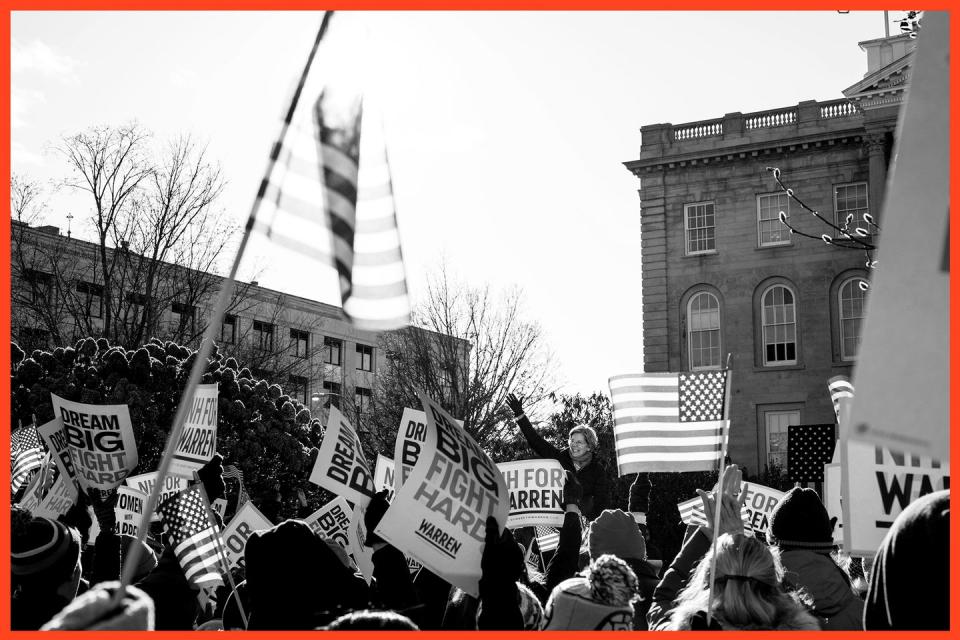
I’ll tell you something I want. I’ve been talking to pharmacists, and the pharmacists I’ve been talking with say—you know what they’d like to be able to do? Just two things. They’d like to be able to take—or two additional things—throat swabs for strep and cheek swabs or mouth swabs for the flu. And then be able to prescribe—based on your history, of course—be able to prescribe either the antibiotic you need (penicillin, the one of choice) and Tamiflu to be able to get people treatment right away. They don’t have to go sit in a doctor’s office for hours and hours. You know what? It’s faster and it’s cheaper
One of the things about moving away from a system where the insurance companies make their profits by building a delay, by saying “no.” Think about that. Insurance companies—I think the numbers are—made about $17 billion in profits last year. Health insurance companies, think how they made every dollar of that profit, it was by taking in premiums and then when someone needed care, saying, “No.” Basically 17 billion times, right?
And so the idea that you move that out of the system and instead try to find the most effective, efficient ways for people to get the health care they need. Busy people, people who want to get on with their lives, to get the care they need. Specialized care for people with diabetes instead of having one person with diabetes getting care over here and another one over here. Does it make sense to help bring them together? There’s been some great experimentation around this. And up the care level for people so that people are healthier and the costs go down.
So I think we just have great opportunities in this area, but it starts by recognizing health care is not a great market and this is not where people should or companies should be trying to make billions of dollars in profits. This is about our care and we need to get this right.
Jessica Pels: So another system that could probably use some improving is the campaigning system. I mean, at this point, you’ve been campaigning for almost a year.
Elizabeth Warren: Yes. In fact, a little over a year.
Jessica Pels: Yes, a year in your life. So obviously, you have deep insight into this and into the presidential election process, which many people find flawed. Forty-five percent of our readers think the debates are more harmful than they are helpful. Eighty percent ended up skipping most of the debates in 2019. Sixty-one percent of our readers think the primary cycle is way too long. I’m curious about what your particular pain points are and have been and I have to ask if you think that systemic sexism is one of them.
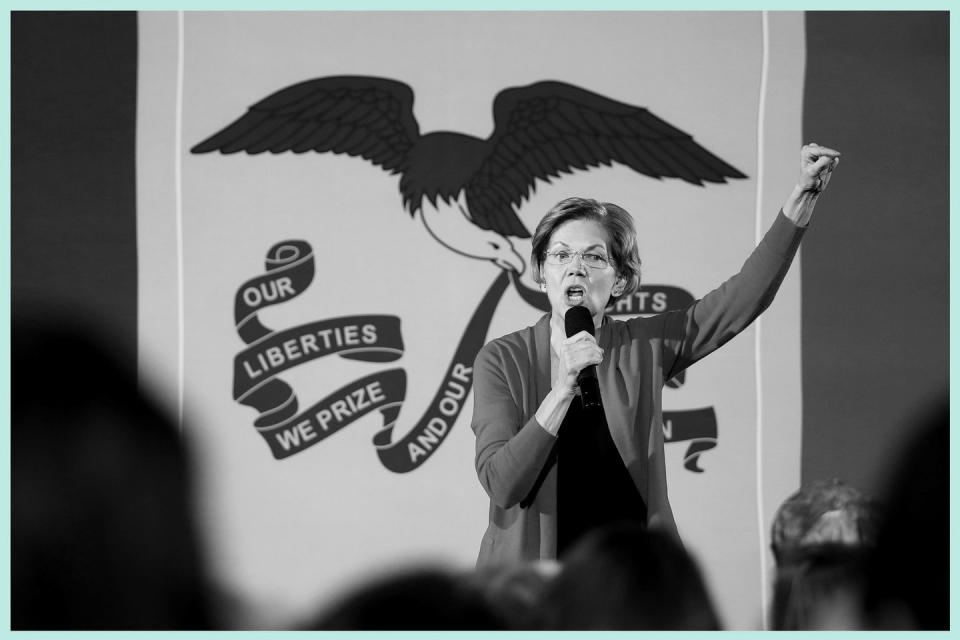
Elizabeth Warren: Oh, yeah. For me, though, you asked where the pain point is the worst for me. It’s around money and the influence of money in the system. I made the decision when I got into this presidential race. I’m not a lifetime politician. I’m a lifetime teacher. I was a special-education teacher. I had 4- to 6-year-olds. I ended up going to law school with a baby and started teaching almost immediately in law school. So I spent most of my life somewhere else, not thinking about politics.
And when I decided to run for Senate in 2012, I knew the fight. The reason I was in this, because I’ve spent my life on what’s happening to working families. Why is America’s middle class being hollowed out? Why is it that people who work every bit as hard as my parents worked two generations ago, that the next generation finds the path so much rockier and so much steeper, and for people of color, even rockier and even steeper. And the reason behind this is very much the influence of money.

A government that works great for giant drug companies, a government that works great for giant insurance companies, a government that works great for oil companies that want to drill everywhere. Just not a government that works for people trying to get a prescription filled or to get their health care or who are worried about climate change.
And the consequence is, this system has been tilted over and over and over because of the influence of money. So we now live in an America where whatever issue gets you up in the morning, if there’s a decision to be made in Washington, it’s been influenced by money. It’s shaped by money.
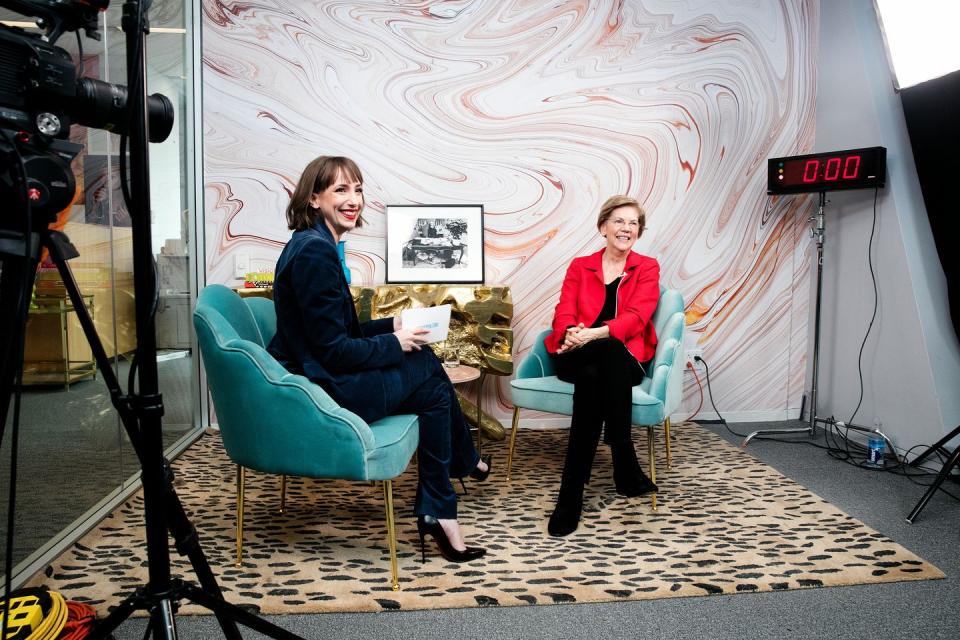
We’ve watched this during the primary process, during the general election. So I decided right up front, I’m not going to do this. I’m going to fund my campaign entirely through grassroots donations. I’m not going to sell access to my time. I’m not going behind closed doors. And I’ve been truly blessed with the number of people who’ve gotten in this fight. I make, I do call time. I call people, just a couple of days ago, who give $10, $20—I placed a call to a woman who’d given $2, who’d marked that she was unemployed but this fight is her fight too. I believe it’s the right way to fund a campaign. And if you agree, go to ElizabethWarren.com, pitch in five bucks, volunteer an hour, do some phone banking, knock on doors, because it’s about our democracy. But here’s the thing: I’m not the only one in this race.
Kamala Harris is a good friend of mine. I’ve known her for a very long time. She has a very special voice. She brought to our Democratic primary her unique perspective. And the day that she announced she was dropping out of the race because of money is the same day a billionaire bought his way onto the debate stage. What worries me is, where are we headed? We’ve got two billionaires in this race now and we’ve got some candidates who spend a lot of time with billionaires and millionaires and corporate executives.
If that’s what it takes to win the Democratic primary and be our candidate for president, then buckle up because this is going to be an America, this could be a democracy that just works better and better for those who are already rich. For those who have already made it. And worse and worse for everyone else.
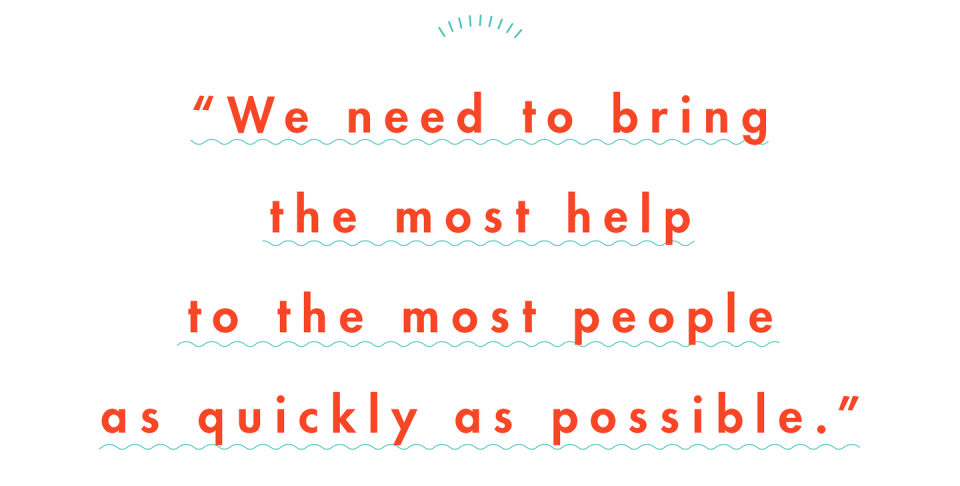
Jessica Pels: A David and Goliath kind of scenario that you find yourself in.
Elizabeth Warren: It really is, and it’s—this fight, it’s not just against the other candidates, it’s against a system that is truly crushing our democracy. Think about that. You know, I get it. Rich people, they’re going to own more shoes than everybody else. They’re going to own more jewelry than everybody else. They may own more houses than everybody else. But they’re not supposed to own a bigger share of our democracy.
And when they do, that’s how we end up with an economy in which the stock market goes up, GDP goes up, corporate profits go up, but 1980 to 2016, 2017, all that new income growth, do you know how much of it went to the bottom 90 percent? Four-tenths of 1 percent. That rounds to zero.
All of the wealth is flowing to the top, and year by year by year, those guys have got their lobbyists in Washington ratcheting up to take a little more and take a little more and take a little more. We just can’t survive as a democracy if we don’t fight back against that. But you know, I will say, here’s the good news: 2020, it’s not 2016; it’s not 2008. 2020...I always think of it this way, when Donald Trump was sworn in, the world changed. January of 2017, and the very next day, biggest protest rally in the history of the world—the world changed again.
So many women are off the sidelines. So many women say, “I care. I get it. The decisions made in this presidential election will touch my health care, will touch my access to birth control and abortion, will touch whether or not I can afford to start a family while I have childcare, will touch whether or not I’m paying off student loans for the next 20 years. Whether or not I can afford to buy a home. It will touch all of those things.” That’s why we just really have this amazing opportunity. We can’t blow it by handing the whole thing over to the billionaires and friends of billionaires. We’ve got to build this one ourselves. That’s what’s going to make it work.
Jessica Pels: So speaking of women building a better world for women, Harvey Weinstein’s trial began Monday. More than 80 women have come forward with allegations against him. As you well know, many of these alleged attacks happened in a professional setting. I’m curious what your policy thoughts are on sexual harassment in the workplace.
Elizabeth Warren: Well, I think that we have got to be really aggressive in enforcing the laws. Do remember that sexual harassment is illegal, and if women—and it is women, typically—are discriminated against—but any vulnerable group—that’s a civil rights violation. We should have federal muscle behind this. It’s not enough just to say, “Ah, terrible thing.” No, I believe we need plans to attack it. I have a plan for a Department of Justice that enforces the rights of everyone. Let’s put some federal muscle behind that, and I’ll tell you one more. We’ll do it across the spectrum. Just equal pay for equal work. Want to talk about that one? And it’s for all women, particularly for women of color, who are paid at the very bottom of the pay scale.
Think about it this way. One in every 4 people who is employed in America today is working for a company that has federal contracts, and those federal contracts, for a lot of those companies, are pretty lucrative. Those are taxpayer dollars. Now, to be able to bid on these federal contracts, the administration, meaning the president all by herself, decides basically what the terms are going to be and who gets to bid.
So here’s my plan: We want to make a real difference on equal pay for equal work and not just stand up and announce, “It’s equal pay day again,” and how far behind women are and how, “Hey, we’re going to get it to equal by the year…2890” or something, that this is going to happen now, is to say to all of these companies, “You want to bid on federal contracts? You’ve got to do two things. You’ve got to produce the data on how women are treated in your company, how people of color are treated in your company, how people with disabilities are treated.” And then we’re going to look at this data.
You can’t just talk the talk about, “Oh, yeah, we believe in equal pay.” You’ve got to show that you’re walking the walk. You want access to American taxpayer dollars to do your business, then by golly, follow the law and do what’s right.
Jessica Pels: Your friend Kamala Harris talked to us about transparency in pay and I think that’s amazing. She focused on the private sector, but that’s a great point, that it would be good to see that kind of information. We have a couple of questions from our brilliant editors for you.
Elizabeth Warren: Terrific.
Jessica Pels: Going to throw it to Jen Ortiz.
Elizabeth Warren: Hi, Jen.
Jen Ortiz, deputy editor: Hi. So you’ve called President Trump’s move to assassinate an Iranian military leader “reckless.” Since then, he has threatened to attack 52 Iranian sites, including potentially cultural sites, which is, of course, a war crime, as his own defense secretary said yesterday. So if Trump moves ahead with ordering this sort of attack, would he be considered a war criminal? And should we be worried about World War III?
Elizabeth Warren: Let me start at the end. Yes, we should be worried about war. The principal job of the president of the United States is to keep America safe. And ordering the killing of Soleimani, who was a bad guy but a high-ranking Iranian government official, has not made America safer. Look where we are today. We have halted the actions against ISIS that we were taking with our allies. We have ordered American civilians out of the entire region because we are worried for their safety. And as you said, we have a president issuing threats to commit war crimes through his tweeting. That doesn’t make America safer. As I walked in, I was looking at the crawl on the TV screens, talking about ratcheting up fear of an Iranian response. What does that mean? The way I see this is that the president has failed in his principal duty. He has failed to keep us safer, and he has taken us directly to the edge of war. Americans don’t want more war in the Middle East. We’ve been there 20 years. We want to end the war in the Middle East and get out. And as president, that’s what I commit to do.
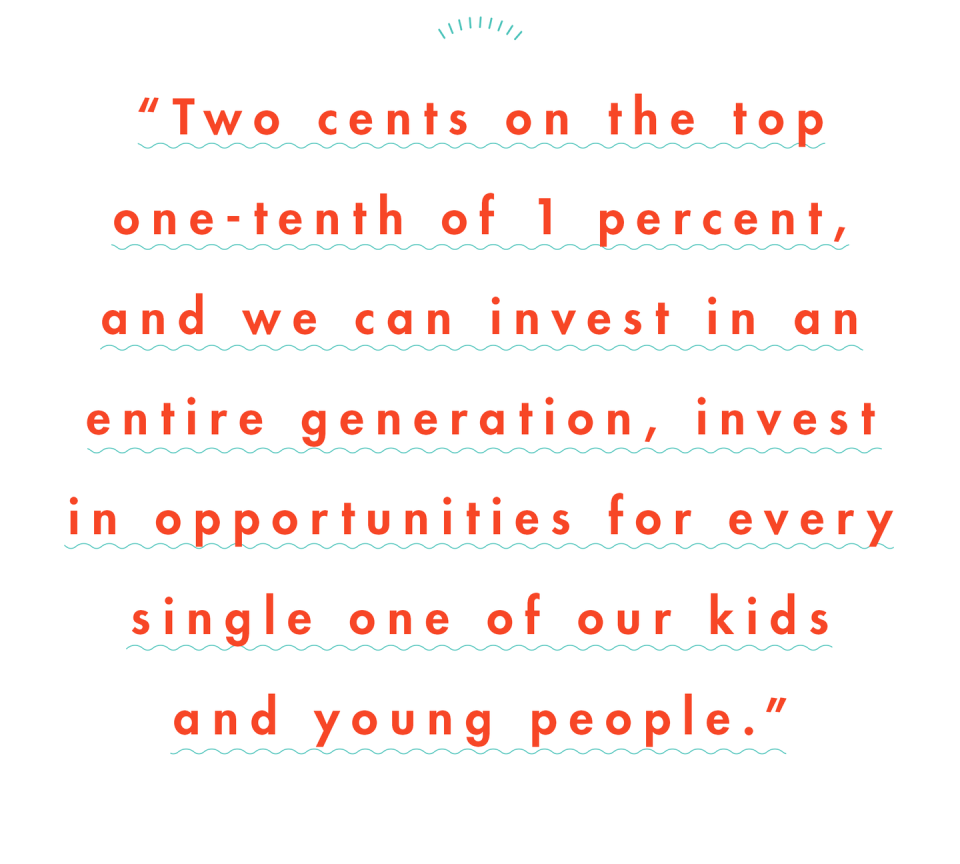
Jessica Pels: Thank you, Jen. Patty?
Patty Camerota, social media editor: Hi, Senator Warren.
Elizabeth Warren: Hi, Patty.
Patty Camerota: So I’m a proud graduate of UMass Amherst.
Elizabeth Warren: Yes. Amherst, where only the “h” is silent.
Patty Camerota: Yes. It took me a while.
Elizabeth Warren: Yes.
Patty Camerota: I came out of school with slightly over $50,000 in student loan debt. You spoke of the cost of education at my 2017 commencement ceremony. And it was an incredible speech, by the way. Now, you have a plan to help over 40 million students get rid of their current student loan debt. But given the fact that the cost to attend public universities like UMass Amherst keeps rising, will that be enough? And how will you make sure that current and future graduates don’t just end up in the same position?
Elizabeth Warren: Excellent questions. So here’s how it goes. I’m going to start in a different place, but I promise I’ll link this up. It’s time for a wealth tax in America. This is a tax on the great fortunes in this country—above $50 million. In other words, your first 50 million free and clear.
Jessica Pels: Noted.
Elizabeth Warren: But your fifty-millionth-and-first dollar, you got to pitch in two cents and two cents on every dollar after that. If you hit a billion, you got to pitch in a few more pennies. The idea is the wealth, not just income, it’s the wealth—these giant fortunes that are growing all on their own, 2 percent, 4 percent, 8 percent, 10 percent a year, and they keep growing. They have their own accountants, their own financial advisers, is to say, “You got to pitch in two cents.” What can we do with two cents?
We can provide universal childcare for all our babies, age 0 to 5, universal pre-K for every 3-year-old and 4-year-old. And we can stop exploiting the people, largely women, largely black and brown women, who do this work, and raise the wages of every childcare worker and preschool teacher in America. Two cents.
In addition, we can make an historic investment of new federal dollars into our public schools, K through 12, $800 billion. That would let us quadruple the money for Title 1 schools, children who come from low-income backgrounds, and—for special-ed teachers, you’ll get this one—fully fund IDEA so that every child with a disability gets the full range of educational help they need to be all they can. We can do that for K to 12.
And then, for post high school, that two cents will, as you said, let us cancel student loan debt for about 43 million Americans, yes, and more. Because the whole point is, let’s not get back in this hole. It will permit us to have tuition-free technical school, two-year college, and four-year college. In other words, the federal government picks up the tuition part of any public university and any historically black college and university, and the state has to do maintenance of effort so the school is made whole, but that’s it. Young people who want to get an education are relieved of tuition burdens.
A couple of more pieces: Expand Pell grants in both directions so they both go to a higher family income level and they are more money, to cover a bigger part of the other educational expenses. And it’s time to level the playing field: $50 billion into our historically black colleges and universities and minority-serving institutions. All of our HBCUs can be tuition-free and really have the money. They have had to do so much with so little for so long.
I just want you to think about that for a minute. Two cents on the top, one-tenth of 1 percent and we can invest in an entire generation, invest in opportunities for every single one of our kids and young people. Let’s do this.
Jessica Pels: We have a few minutes left.
Elizabeth Warren: Sure.
Jessica Pels: With two minutes, I can ask you our famous rapid-fire questions.
Elizabeth Warren: Okay, I’m ready.
Jessica Pels: Okay. What is your New Year’s resolution?
Elizabeth Warren: Walk more, more exercise. I’m trying to up my mileage, my daily mileage.
Jessica Pels: From where to where?
Elizabeth Warren: Well, I don’t know. My eyes may have been bigger than what I can manage here, but I want to go from six and a half miles to seven every day.
Jessica Pels: Wow.
Elizabeth Warren: But...it’s been cold out there.
Jessica Pels: Do you wear a tracker?
Elizabeth Warren: Oh, I carry my phone, which is a whole thing in itself. Everyone tries to get me to put on the tracker. That would be too easy. I started, I was like, “Where’s my phone?” and then have to grab my phone. Yep.
Jessica Pels: Okay. Baby Yoda or old Yoda?
Elizabeth Warren: Oh, baby Yoda. Come on, it’s a baby. You’ve got to love them.
Jessica Pels: It’s so cute.
Elizabeth Warren: It’s so adorable.
Jessica Pels: Which Little Women sister are you?
Elizabeth Warren: Oh, Jo.
Jessica Pels: That’s what we said before you got here.
Elizabeth Warren: Exactly. No one’s surprised by that, right?
Jessica Pels: No, no.
Elizabeth Warren: Yep.
Jessica Pels: Dunkin’ or Starbucks?
Elizabeth Warren: Oh, Dunkin’.
Jessica Pels: That’s my maiden name, so yes.
Elizabeth Warren: There we go, there we go.
Jessica Pels: Okay, so you’re a Cancer. That’s your sign.
Elizabeth Warren: Yes.
Jessica Pels: Cancers are the ultimate homebodies.
Elizabeth Warren: Uh-huh.
Jessica Pels: What change would you make to the White House to make it feel more like home?
Elizabeth Warren: Oh, I’d bring Bailey, our golden retriever.
Jessica Pels: We love Bailey.
Elizabeth Warren: And Bailey loves everyone. Bailey thinks human beings are on this Earth to pat Bailey.
Jessica Pels: He’s not wrong.
Elizabeth Warren: Exactly. When we go someplace where he can have dogs off-leash or something, he’ll run past the dogs and over to the humans and go...scratch me, over here.
Jessica Pels: Smart. Smart boy.
Elizabeth Warren: Good boy. “Good boy,” we call him. Uh-huh.
Jessica Pels: That is my next question, actually, is if you can quickly list every nickname you have for Bailey.
Elizabeth Warren: Oh, Good Boy. Good Boy. Good Boy. The Bails.
Jessica Pels: Ooh, cute.
Elizabeth Warren: Uh-huh. And Our Boy. I call Bruce when I’m on the road and say, “How’s Our Boy?”
Jessica Pels: Aww.
Elizabeth Warren: Oh, and Bruce sends me these pictures of Bailey looking out the window going—[makes sad face].
Jessica Pels: Aww.
Elizabeth Warren: Bruce will say, “He wants his peeps together.” Bailey wants us not just in the same house. He wants us in the same room, preferably in the same part of the room, with Bailey exactly equidistant between us.
Jessica Pels: Any tips for Kate McKinnon on her SNL portrayal of you?
Elizabeth Warren: Oh, she is fabulous. In fact, I’m thinking that—let me try this out on you. Maybe I should talk about this out on the campaign trail, and that is, “Elect me president and you’ll get eight years of Kate McKinnon on Saturday Night Live.”
Jessica Pels: That’s the real campaign.
Elizabeth Warren: There we go. She is so talented and so smart and she wears the right jackets.
Jessica Pels: There you go. Doing well, Kate. Okay, so I know that you’re doing a local town hall with Julián Castro...
Elizabeth Warren: Yes.
Jessica Pels: ...while you’re here. Is there anything you would like to share with us?
Elizabeth Warren: Julián is such a good man, and I’ve known him for a long time. He’s someone who fights from the heart, and he fights to make sure that people who’ve been cut out of this process over and over and over actually get a chance to be part of our democracy. If they can be part of our democracy, then they’ll have some power in the system, and that means we’ll write better laws that help support economic access. That’s why Julián is in this fight. I really admire the fact that he got in this presidential race. He fought for what he believed in. When he decided that there just wasn’t a path for him this time, he didn’t just hang back and wait to see what happened. He jumped right back in and said, “I want to do this with you, Elizabeth.” So we’re doing a town hall tonight. He’s going to be out on the road. Julián is going to make this happen.
Jessica Pels: That’s great.
Elizabeth Warren: Yeah.
Jessica Pels: Yes. And finally—
Elizabeth Warren: Yes.
Jessica Pels: You knew this was coming. What is your skincare routine?
Elizabeth Warren: Pond’s Moisturizer.
Jessica Pels: That’s a good one.
Elizabeth Warren: Every morning, every night. And I never wash my face.
Jessica Pels: Wow.
Elizabeth Warren: Nope, nope.
Jessica Pels: You’re one of those.
Elizabeth Warren: Yeah, I am.
Jessica Pels: That’s a very French thing.
Elizabeth Warren: There you go. So I have—had, she’s passed now—but a much older cousin named Tootsie. Years ago, I was, I guess probably somewhere in my 20s, and we’re at a big family reunion. And Tootsie was beautiful. I looked over at her, and I said, “Toots, how do you have such gorgeous skin?” She said, “Pond’s Moisturizer every morning, every night, and never wash your face.” So from Tootsie to me to you.
Jessica Pels: To all 81 million of our readers.
Elizabeth Warren: There we go, exactly.
Jessica Pels: That’s amazing. Wow. Well, thank you.
Elizabeth Warren: Exactly.
Jessica Pels: Thank you so much for your time today.
Elizabeth Warren: It’s so good to see you.
Jessica Pels: So nice to meet you.
Elizabeth Warren: Thank you.
Jessica Pels: Thank you.
Elizabeth Warren: Thank you. It’s so good to see you all.

You Might Also Like

